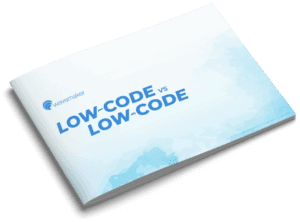Low-code means different things to different people. While the industry is exploding with low-code platforms, ours is purpose-built for professional developers. If you are already using a low-code platform or shopping for one, there are many critical factors to consider. Read on..
Will I be the owner of the code?
![]() The code should be yours to mix, extend, customize, transfer or export
The code should be yours to mix, extend, customize, transfer or export
What should “no lock-in” mean to me?
![]() No shackles of run-time cost, proprietary architecture, and limited infra options
No shackles of run-time cost, proprietary architecture, and limited infra options
Will the developers need to be certified to use the platform?
![]() You want quick learning and future-proofing your teams’ skills
You want quick learning and future-proofing your teams’ skills
Is my vendor’s pricing strategy sustainable?
![]() Scaling up shouldn’t disproportionately increase the cost of doing business
Scaling up shouldn’t disproportionately increase the cost of doing business
 With over 2 decades of experience in the application development and modernization field, our product evangelists have enlisted 12 critical capabilities to consider while comparing various low-code platforms.
With over 2 decades of experience in the application development and modernization field, our product evangelists have enlisted 12 critical capabilities to consider while comparing various low-code platforms.
Find out how the 5 most popular low-code platforms stack up on each of these capabilities. Download the document for an objective, quick, and consumable take on the comparison of low-code platforms
Reduce repetitive development work and save heaps in time and effort.
Read more insights on app development, technology, and WaveMaker on our blog.